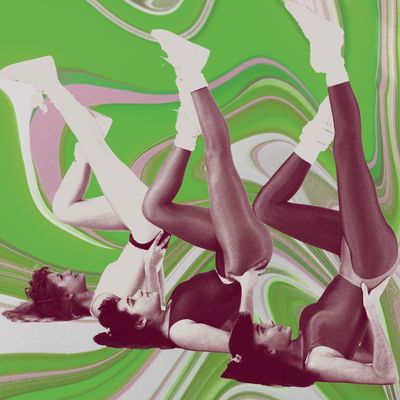
On Election Day in November, Sami awoke in her Brooklyn apartment with a pit in her stomach. As the 31-year-old publicist considered the possibility of another Donald Trump presidency, her anxiety spiked.
Back in 2016, his first win had shocked and unmoored her. That year, after days of crying, Sami drowned herself in her work, posted on social media, and watched the news every morning. “I was informed and fired up, but I was also full of so much anger,” she says. After a while, her mental health suffered; she felt hopeless, overwhelmed, and like she should just give up.
But this time, when faced with the reality of Trump’s second term, Sami told herself she simply couldn’t handle another four years of feeling like the world was ending. And so she stopped scrolling and signed up for her first half-marathon in Brooklyn in April.
Countless friends have told me recently that they can’t cope with a Trump presidency like they did the first time around. People who say they woke up on November 6 and thought: I’m too old to drink the way I did eight years ago, or who wonder, Where did getting worked up over every CNN push alert get me? Exercise, they think, is the answer. On November 12, the writer, sociologist, and professor Tressie McMillan Cottom hopped on Instagram to share a new personal lifting record at the gym. “Don’t let Trump win,” she said in the clip, encouraging her followers to go out and set their own personal records. Others on TikTok posted about going on long walks to distract themselves from the barrage of Trump-related news. One video simply read, “motivation for gym: there is a trump supporter than can outrun you.”
I talked to a woman in Seattle who told me she’s been working out almost daily since the election. Another told me her first reaction to Trump’s win was to go out and buy a pilates reformer. One boxing instructor in Manhattan revealed that people have been coming up to him before class to tell him just how much they need to hit something.
Ali Manning, the founder of Dyke Run NYC, which hosts weekly runs along Manhattan’s West Side Highway, started seeing an influx of first-time runners joining in the months leading up to the election; many, she told me, were searching for community as a respite from the possibility of another Trump win. “Running isn’t the most immediately gratifying thing,” she says. “It’s almost like you’re putting yourself through a different kind of pain instead of the pain that could be our future. But at least there’s long-term gratification if you stick with it.”
Irena Pierce, a psychologist from Orlando, also took to the pavement. “My coping strategies in 2016 weren’t optimal,” she told me, citing the classic combo of doomscrolling and wine at night. This time, she felt like she needed something different. She laced up her sneakers. “Running is my rebellion against the powerlessness I felt,” she says. “The endorphins remind me that even in chaos, I can have a little space to myself.”
Others doubled down on getting jacked. Lucy Tartal, an administrative assistant who lives in Philadelphia, witnessed people calling her friends homophobic slurs on more than one occasion; they’ve committed to weight lifting with the next four years in mind. “My stature is relatively small, and I wear my queerness on my sleeve when I’m out in the world,” the 26-year-old says. “Knowing that I could protect myself helps me feel strong and powerful.”
Or, if you’re looking for something lower impact, consider line dancing. Eight years earlier, after Trump’s first win, Rory Kohl, an ad tech worker in Astoria, found herself slamming beers to numb feelings of dread; this time, to distract herself from her state of shock, she attended a class with a queer-friendly line-dancing group in New York. When the group learned “Good Luck, Babe!” — Chappell Roan’s breakup anthem that helped usher in her meteoric rise last year — the room exploded during the song’s cathartic bridge. “Everyone was screaming the lyrics,” the 31-year-old says. “I feel like it took our minds off everything. I came out of that class much better than I went into it.” The cowboy boots stuck. “Class is the only time my brain switches off,” she says. “It’s a positive space in a climate that doesn’t seem at all positive.”
I’ve also started spending more time in the gym — the most I have since my time as a college ice-hockey player, when it wouldn’t have been a stretch to say I lived in the rink. Back in 2016, I spent Election Night at a friend’s party in Brooklyn, downing the red, white, and blue Jell-O shots she’d made — a relic of a time when droves of people earnestly sang along to “Fight Song” at rallies. I know the MAGA faithful might laugh at people like me, “coping” with reality at the Blink Fitness in Bushwick. But from where I sit, the forecast is bleak. I’d rather risk feeling a little cringe than wake up hungover.
Sami, the publicist in Brooklyn, shared the news of her first half-marathon with friends who also feel a sense of dread about the coming four years. Three signed up to run alongside her, while others are planning to cheer her on from the sidelines. “I keep joking to my friends that my will to live right now is hinged on this half-marathon,” she says with a laugh. “But there’s a little bit of truth to it.”

